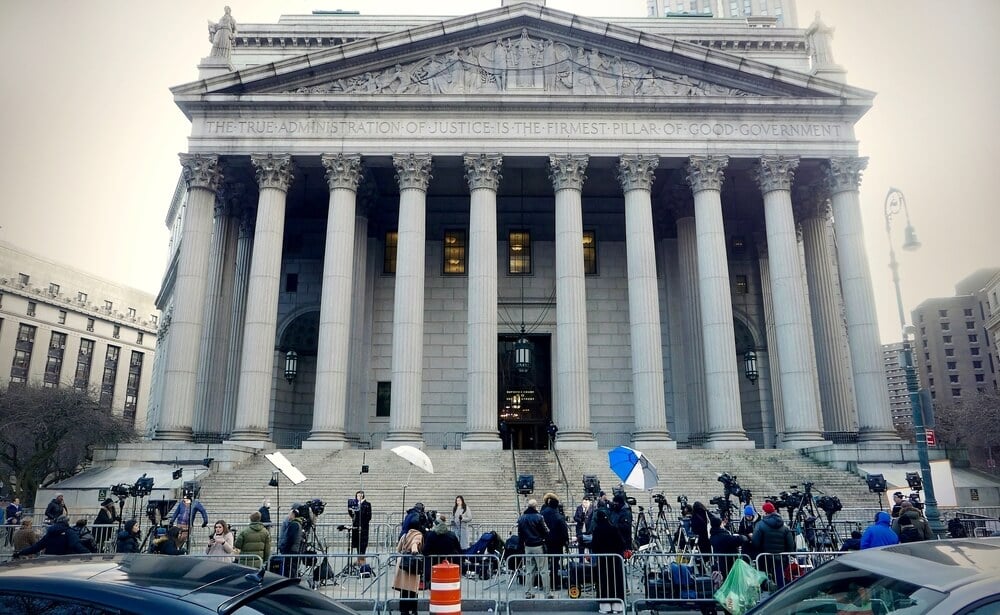Despite his and his numerous team members' efforts to avoid it, Donald Trump will become the first felon in history to hold the office of US president. The sentencing, which New York Supreme Court Justice Juan Merchan has scheduled for 10 January, will not affect Trump's legitimacy or ability to fulfil his presidential duties.
It will have even less of an impact on the trust he enjoys among his voters, which he won again in the last November elections. Nevertheless, Trump begins his new term in the White House with a stigma that no American president has had before.
Last Friday, Judge Merchan somewhat surprisingly set 10 January as the date for sentencing in the case in which Trump was found guilty of 34 counts for falsifying business records, i.e., covering up hush money paid to porn star Stormy Daniels on the eve of the 2016 election.
It was the first of four court proceedings initiated against Trump, in which he was found guilty. At that moment, on 30 May last year, Trump was five months away from the election, and the verdict before the court in Manhattan represented a major political risk for him.
It will turn out that it did not stand in the way of his new victory and that his rhetoric among the voters, which focused more on the persecution he was exposed to by the democratic establishment than the authority of the American judiciary, was convincing.
Does Trump have immunity?
Trump's team is using the same terminology when discussing the timing of the sentencing on 10 January. His communications director, Steven Cheung, reiterated that the entire case was a "witch hunt," Judge Merchan was "deeply conflicted," and that the case should not have been brought in the first place and should have been dismissed by the judge.
The Trump staff's expectation that this case will also be dismissed stems from the fact that the two other cases for unlawfully retaining classified documents and plotting to overturn the 2020 election were dismissed and the case regarding election interference in Georgia was paused.
Other courts hold the belief that punishing the incoming president would be inconsistent with the constitutional mechanisms protecting the office of president, particularly through immunity, but New York Judge Merchan's decision to conclude the case contradicts this belief.
Presidential immunity from criminal process for a sitting president does not extend to a president-elect - Judge Merchan
"This Court finds that presidential immunity from criminal process for a sitting president does not extend to a president-elect," Judge Merchan said in the 18-page judgement he released last Friday.
In December of last year, he turned down a request from Trump's representatives that also involved immunity. He reasoned that the legal protection enjoyed by former US presidents could not be applied to the case he was conducting because the crime for which Trump was convicted was committed before he became US president in 2016.
A unique case
From the outset, Trump's trial in the New York court has set numerous precedents, as it could not rely on the practise of conducting the proceedings and subsequently sentencing and now convicting the former and future president.
Therefore, Judge Merchan's decisions are ground-breaking, even though they were made under enormous political pressure during the election campaign and the fact that the convicted man was elected US President.
He remained convinced of the correctness of the entire procedure and insisted on protecting the independence of the judiciary. In the judge's view, overturning Trump's conviction, which the Trump team had sought with considerable insistence, would have damaged public confidence in the rule of law.
The fine could be as high as $170,000
"It was the premeditated and continuous deception by the leader of the free world that is the gravamen of this offence," the judge wrote.
Considering that Judge Merchan announced at sentencing that Trump will not go to prison, we can only expect a fine for the crime he was convicted of.
The fine could be as high as $170,000, as each of the 34 counts he was convicted of carries a maximum fine of $5,000.
Presidential term under the shadow
Money will certainly not be a problem for the convicted man and his team, who will be promoted to very high positions in the administration just ten days after the sentencing. However, some consequences will remain.
The US, as well as a large number of countries, has restrictive rules on the entry of convicted felons into their territory. According to CBS, this includes some of the US's closest allies—the UK, Australia, and Canada, where the G7 summit will be held this year. China does not even allow felons to enter the country.
 The New York verdict and sentencing will overshadow Trump's presidency just 10 days before he takes office
The New York verdict and sentencing will overshadow Trump's presidency just 10 days before he takes office
It goes without saying that none of these governments will interfere if Trump decides to visit them over the next four years. However, it will continue to be a burden on his presidency, even if it is only mentioned in media reports.
Moreover, the New York verdict and sentencing will overshadow Trump's presidency just 10 days before he takes office.
His case will be a constant opportunity for all his critics to score points against him whenever the pillars of the democratic order, such as the rule of law and the independence of the judiciary, are discussed.